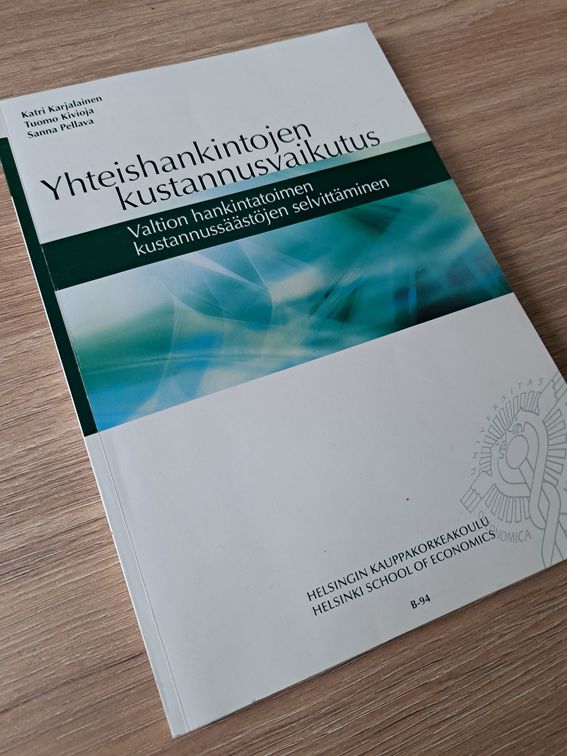Highlights from the past decades – Ministry of Finance commission

The customized student business projects at Aalto University School of Business celebrate their 30th anniversary this year. To mark the occasion, we bring to focus projects from the past and discuss the ripple effects they have had.
***
One of the projects that has received special attention over the years is related to a study commissioned by the Ministry of Finance. The project carried out in 2008 examined the value of centralising procurement by evaluating the cost effects of the Finnish Government’s annual joint procurement (potential about 1.1 billion).

After the project, Tomi Hytönen, project manager who represented the Ministry of Finance, gave the following feedback on the collaboration:
‘The project went very well. The cost estimates were held to, the timetable was kept to and the implementation was carried out by skilled people and in the appropriate manner. As far as our needs were concerned the end result was a bull’s-eye, the first research in Finland to evaluate the benefit of centralised competitive tenders in the public sector, and there does not seem to be anything comparable elsewhere in Europe. The data from the research has been used in directing the government’s procurement activities as well as in drawing up the government’s basic documents, such as the procurement strategy and handbook, in the preparation of the government’s productivity projects and in the development of legislation on procurement activity.’
Currently, Budget Counsellor Hytönen is a head of unit at the Ministry of Finance's Public Sector ICT Department. He continues to emphasise the value of the study carried out at the School of Business.
‘At the time the study was completed, the impact of centralised purchasing had been studied relatively little. Assumptions existed, of course, but only the study carried out by the School of Business provided research-based and reliable information on the cost benefits of centralisation. Even today, the study can be seen as one of the fundamental works in the field. The study has been utilised not only in discussions on savings, efficiency and centralisation in the central government, but also in the municipal sector. The about one-billion-euro potential of joint purchases presented in the study is currently real.’
Valuable experience
Afterwards, member of the project team Tuomo Kivioja also remembers the project with enthusiasm:
‘At the beginning of the project, I was a fresh accounting graduate without a job. I was very grateful and enthusiastic about being included in the project team. Getting to join the project at the beginning of my career was an incredibly fortunate opportunity. After all these years, I still appreciate this experience very much.
What was great about the project was that, although the topic of the research project was related to procurements, I was selected to participate with my background in accounting. During the project and in my career after it, I have felt that there is a particular strength in a group that has been assembled on a cross-disciplinary basis. I would encourage current Aalto University students to not hesitate to apply for projects that are interesting, even if their own major is not directly related to the topic.
Cooperation with Sanna Pellava, who studied logistics, and Katri Karjalainen, a doctoral student who wrote her thesis on the topic, was excellent. The high quality of the project was thanks to Katri keeping the project on track and focusing on the right things. For her part, Sanna found material for her Master's thesis in the project.
The unexpected additional benefit was that the project helped me to become more familiar with the activities of the Finnish Government. This understanding has been useful in my subsequent career, as the government is an important player in many sectors.
Towards the end of the project, my days became quite busy, as I also got a part-time accountant position from Nokia. During the day, I was finishing up the School of Business project and in the evenings, I was working for Nokia. The project has also been very useful in business, as the skills learned in the project strengthened my working competencies. Another great benefit was that the requirement level of the student project was higher and extent of it was broader than in my first job at Nokia. Since then, my duties have become more challenging, and I’ve held various expert and management positions in the financial administration of companies.
An interesting coincidence is that my current position as Senior Manager at KPMG's Transaction Service has a lot in common with the student project early in my career. Both involve meeting people, conducting interviews, and collecting and analysing data.
Therefore, I would advise current students that it is worth participating in business projects during their studies. It will be valuable for job seeking and future careers.’
From project advisor to the youngest female doctorate in the history of the School of Business
The project was guided by young researcher Katri Kauppi (née Karjalainen), who was working on her dissertation at the same time.
‘At the beginning of the project, I had begun to work on my doctoral thesis on procurements, so the project was perfectly within my own field of research.
I had an interesting double role in the project. I was the second advisor, with Dr Aimo Inkiläinen, to guide the students' work, and I also participated in the actual research, as the project supported my own doctoral thesis research. The project was highly rewarding in terms of both experience and research.
A year after the end of the project, I became a Doctor of Science (Economics and Business Administration). When I graduated at the age of 26, I was the youngest female doctorate in the history of Helsinki School of Business. Cooperation in the Ministry of Finance's project also had a positive impact on my graduation schedule. Through the project, I gained access to public administration data and was able to build networks. Pressure brought on by the client made sure that my research progressed. After the project, I used the study for writing an article for a high-quality scientific publication, for example.
The project also helped me get publicity and build a profile as a public procurement expert. Over the next few years, based on this study, I received several invitations to give expert lectures across Europe. I even received an invitation to the OECD Task Force, which was sent to support the government of Greece in planning public procurement savings in the aftermath of the financial crisis.
Shortly after I graduated, I spent three years as a researcher at the University of Manchester and University of Nottingham in England. After my stay abroad, I returned to the Tenure Track of the Aalto University School of Business, and now I'm a professor of logistics, with public procurement still as my central research area.
Looking back to the project, I can only encourage other researchers to join students' custom business projects if there are topics that interest them. Cooperation creates contact networks and, at the same time, can generate unexpected benefits from the perspective of your own research.’
Customized Student Business Projects 30 years
Customized Student Business Projects have been carried out since 1993







